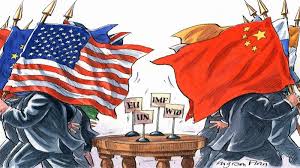Anxious About a Trade War? Here’s Where to Invest

THE STOCK MARKET IS FINALLY falling out of love with the Trump administration. During the President’s first year in office, the S&P 500 rose a jaw-dropping 21.8%, but that momentum has petered out. As of mid-July, the index was 3% below its January 2018 peak. There are plenty of reasons that the bull is stumbling (see “The End Is Near” in this issue), but rising trade tensions around the globe are among the biggest. President Trump, having declared that Americans “are on the losing side of almost all trade deals,” has erected new barriers to reverse that streak—leaving investors to wonder whether they’ll be the new losers.
Earlier this year, the administration slapped tariffs on steel and aluminum imported from partners ranging from Canada to the European Union to Japan—invoking the seldom-used 1962 Trade Expansion Act, which gives the President broad powers to impose trade sanctions on national security grounds. Those countries, most of them staunch U.S. allies, soon retaliated with tariffs of their own.
The President raised the stakes this summer by taking on China—America’s biggest trading partner and a crucial supplier to countless U.S. companies. Citing China’s own trade barriers and its often onerous demands that foreign companies share technology with Chinese firms, the White House put a 25% tax on dozens of Chinese-made goods, from boat motors to LED bulbs, affecting about $ 34 billion in trade annually. China, too, retaliated, and that fight could soon expand much further: In July, the U.S. Trade Representative announced plans to impose 10% levies on another $ 200 billion in Chinese exports. Meanwhile, administration officials have mulled other tariffs that could affect automobiles, apparel, and more.
Shareholders haven’t panicked yet, in part because current tariffs affect only a tiny fraction of global trade. The World Bank estimates that even factoring in the conflict, global growth in 2018 will reach 3.1%, the fastest rate since 2011. “Investors are hanging tough,” says Lindsey Bell, investment strategist with research fi rm CFRA. “They assume that [the U.S. campaign] is just a negotiating tactic and that in the long run it will be worth it.”
STILL, EVEN THE MODEST TAXES and countermeasures enacted so far are hurting some industries a great deal, crimping revenue for businesses ranging from soybean growers to motorcycle-maker Harley-Davidson. And the conflict could metastasize into a much graver threat to stock portfolios if trade barriers lead companies to scale back their plans to expand and invest.
The automobile industry may have the most at stake in the trade battle. Steel and aluminum tariff s are already increasing input prices for U.S. automakers, and the administration has raised the threat of taxes of as much as 20% on imported cars and parts—a huge headache for U.S. manufacturers whose supply chains rely on NAFTA countries. “Tariff s on auto imports from Mexico and Canada would be extremely bad,” says David Whiston, automotive equity analyst with Morningstar; the Alliance of Automobile Manufacturers says such tariff s could cause U.S. car sales to fall by up to 10%. That helps explain why Ford and General Motors have lagged the market despite healthy U.S. sales this year; for now, they remain stocks to avoid.
Technology is another arena where investors should tread warily. William Reinsch, senior adviser at the Center for Strategic and International Studies, notes that China has a history of imposing inspection requirements or other legal hurdles on tech companies to punish trade rivals. Such issues are playing out in the semiconductor industry right now: Investors in Micron, for example, got a scare in July when a Chinese court issued a preliminary injunction banning it from selling 26 separate chips in China. Still, CFRA’s Bell suggests that tech more broadly is a good buy, given that trade-war fears (among other headlines) periodically scare away less savvy investors. Micron is a case in point: After falling 6% on the China news, its stock rallied when the company assured shareholders that the injunction affected only 1% of its sales. Morningstar analyst Abhinav Davuluri says investors hoping to play the fast-rising semiconductor sector without getting caught in trade crosshairs could consider South Korea’s Samsung ($ 40) and SK Hynix ($ 76), which would benefit from disruptions to the U.S.-China chip trade.
China has already raised taxes on its favorite American import—soybeans—and prices for that commodity have tumbled more than 20% since April. But while farmers are feeling the pain, agricultural companies shouldn’t suffer much. J.P. Morgan analyst Ann Duignan says fi rms like Archer Daniels Midland and Bunge have insulated themselves from trade disputes by building sourcing capacity for soybeans and other commodities outside the U.S., in such countries as Brazil and Argentina. And as middlemen in the grain supply chain, they actually benefit in the short term from depressed U.S. prices. Duignan pegs Bunge (BG, $ 69) in particular as an undervalued stock, weighed down by trade headlines and the temporary effects of a truckers’ strike that ended in June.
Of course, trying to forecast how a trade war could affect every stock you own is a daunting task—and perhaps a fruitless one in this unpredictable climate. A simpler approach, says Shawn Cruz, manager of trading strategy at TD Ameritrade, is to diversify your portfolio away from U.S. large-cap stocks. True, smaller companies are as much at risk as larger ones of having their supply chains disrupted by tariffs. But companies in the Russell 2000, which tracks U.S. small-caps, derive just 21% of their revenue from outside the U.S., compared with 38% for those in the S&P 500—and that greater domestic focus shields them from the full impact of trade battles. It’s a good time to split a U.S. stock allocation 50/50 between the S&P 500 and smallcaps, using an exchange-traded fund like iShares Russell 2000 ETF (IWM). Says Cruz, “Small-caps make sense if you think the China tariff s are just an opening salvo.”
